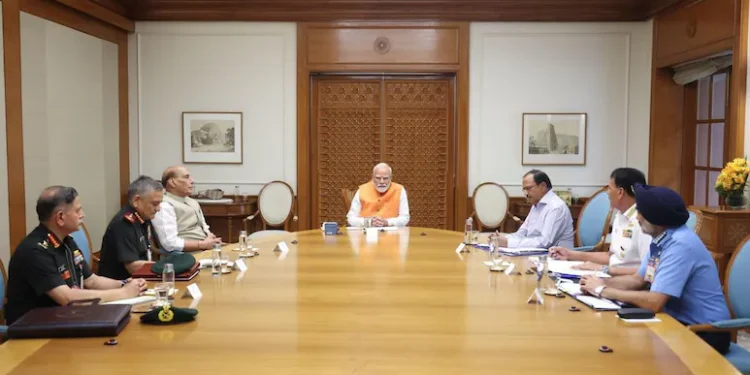Lagatar24 Desk
New Delhi: Prime Minister Narendra Modi chaired a crucial high-level meeting at his Delhi residence today to review the ongoing fallout of the Pahalgam terror attack and assess the security situation in Jammu and Kashmir.
Senior Leaders In Attendance
Defence Minister Rajnath Singh, National Security Advisor Ajit Doval, and Chief of Defence Staff General Anil Chauhan were present during the meeting. Rajnath Singh had earlier vowed a “strong response” to the Pahalgam attack, reiterating the Prime Minister’s assurance that India will punish the terrorists and their handlers.
Second CCS Meeting In Seven Days
This meet comes a day ahead of a scheduled meeting of the Cabinet Committee on Security (CCS), the government’s apex decision-making body on national security, which will convene for the second time in a week.
Sources revealed that the CCS meeting would be followed by a session of the Cabinet Committee on Political Affairs (CCPA), led by PM Modi, and including ministers from key departments such as transport, health, agriculture, and railways.
Additionally, an Economic Affairs Committee meeting is also on the agenda, reflecting the seriousness and intensity of India’s planning for a comprehensive response to cross-border terrorism.
India’s Initial Response: Visa Revocation And Indus Waters Treaty Suspension
As part of the initial steps taken by India, all visas issued to Pakistani nationals (except for Pakistani Hindus and those granted long-term visas) were revoked. Thousands of Pakistanis have since left India through border crossings, including the Attari-Wagah checkpoint.
Further, India suspended the Indus Waters Treaty (IWT), a critical 1960 water-sharing agreement, severely impacting Pakistan’s water supply. Islamabad reacted strongly, calling the suspension an “act of war,” and retaliated by suspending visas for Indians.
The Pahalgam Terror Attack: A Grim Reminder
On April 22, terrorists attacked tourists in Pahalgam’s Baisaran meadow, resulting in 26 deaths, including a Kashmiri pony ride operator.
The Resistance Front (TRF), a proxy of Lashkar-e-Taiba, claimed responsibility, although the five terrorists involved are still at large. A massive manhunt is currently underway to apprehend them.
Indian security agencies have provided concrete evidence of Pakistan’s involvement in the attack, and this material has been shared with top diplomats from countries like the US, Russia, China, Japan, and various European nations.
Prime Minister Modi, who immediately returned from Saudi Arabia after the attack without entering Pakistan’s airspace, stated firmly that terrorism’s evil designs will not succeed.







